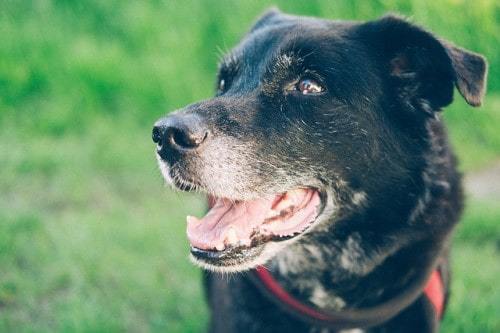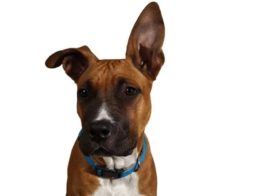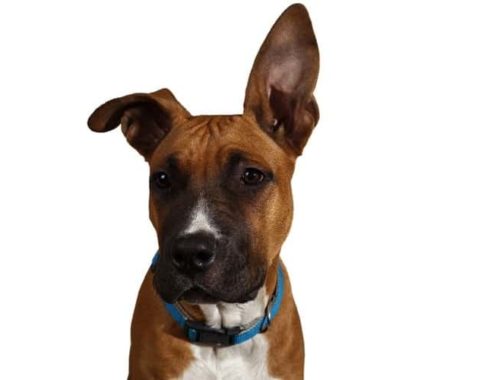With approximately 20% of adults in the Western world being sleep deprived (Stranges, et. al, 2012), melatonin supplements have grown in popularity. Some folks find it helps them get a good night’s sleep without harsh side effects. Pet owners have experimented with it to treat their pets, too. But is melatonin safe for dogs?
What Is Melatonin?
Melatonin is a hormone produced by the pineal gland in the brain of animals (and humans). It’s involved in the neuroendocrine control of the the sleep cycle and hair shedding/growth in dogs. Melatonin supplements contain a synthetic form of the hormone and are available without a prescription in the United States.
Melatonin use in dogs has not been studied extensively. Major side effects are rare but melatonin is a hormone and should be used with care. It can have effects on other hormones, including thyroid and sex hormones (Ashley, et. al, 1999). Dogs seem to require high dosages to see any effect so it wouldn’t be surprising if other systems were affected with long-term use.

Potential Uses of Melatonin in Dogs
Anxiety
Internet sources promote the use of melatonin on its own or combined with other calming vitamins, minerals, and herbs. It may help dogs with thunderstorm phobia, general anxiety, and night walking behavior. At least one study showed a reduction in anxiety-induced behavior in rats (Spasojevic, et. al, 2016). Melatonin has the potential to help dogs with mild anxiety but is probably not strong enough to treat severe anxiety.
Cushing’s Disease
Cushing’s disease is an endocrine abnormality that affects older dogs. Excessive production of cortisol causes symptoms including panting, hair loss, weight gain, increased thirst and increased urination. Because melatonin may reduce cortisol levels, some veterinarians try it as an alternative treatment for Cushing’s disease. Limited clinical evidence supports the use of melatonin for Cushing’s disease symptoms (Oliver, 2007). Although melatonin may help dogs with mild symptoms for a time, but most eventually have a return of symptoms.
Hair Cycle Abnormalities (Alopecia X)
Alopecia X is a poorly understood disease in which dogs lose hair due to unknown causes. It occurs most frequently in double-coated breeds like Pomeranians and Huskies. Dogs normally shed and regrow hair with the change of seasons. Dogs with Alopecia X may shed hair, but fail to regrow it as they should.
In one study, melatonin supplementation led to the regrowth of hair in 18 of 29 dogs with hair cycle abnormalities (Frank, et al., 2004). Unfortunately, hair regrowth seen with the use of melatonin is not permanent and symptoms return after some time (Frank, 2005).
Possible Adverse Effects of Melatonin Use in Dogs
Veterinarians have prescribed melatonin for use in dogs over the last couple of decades. Based on anecdotal reports, significant side effects are rare (Plumb, 2015). Humans taking melatonin report the following side effects which could potentially affect dogs.
- Lethargy
- Depression
- Weight gain
- Changes in fertility
Use extreme caution if your dog has kidney or liver problems. Don’t give melatonin if your dog is taking other medications without first consulting your veterinarian.
How to Use Melatonin in Dogs
The recommended dosing range of melatonin for dogs is 3 to 12 mg by mouth (depending on the dog’s size) every 8 to 12 hours. Dogs can take melatonin long-term, but if you don’t see improvement after a few months, stop using it.
Any oral medication or supplement can cause digestive upset. If your dog develops vomiting, diarrhea or a decreased appetite, stop using the supplement. See your veterinarian for help if symptoms are severe or don’t improve within 24 hours.
Products Containing Melatonin
If your dog has anxiety, you might want to try a combination product containing L-Theanine, kava-kava, chamomile, passion flower, ginger, vitamin B1, and/or colostrum in addition to melatonin. The addition of herbs, amino acids and vitamins should provide an enhanced calming effect.
For dogs with hair cycle abnormalities, use a melatonin-only supplement. You can try the tablet or liquid form made for humans. If your dog hates taking medicine, try a chewable melatonin supplement made just for dogs.
Conclusion
Melatonin is an over the counter supplement promoted to treat anxiety, sleeplessness, Cushing’s disease, and hair cycle abnormalities in dogs. It is unlikely to cause severe side effects when used at the usual dosages. The effectiveness of melatonin is probably overestimated in popular media, but it might be worth a try for anxiety, hair cycle abnomalities, and Cushing’s disease symptoms in dogs.
References
Ashley, P. F., Frank, L. A., Schmeitzel, L. P., Bailey, E. M., & Oliver, J. W. (1999). Effect of oral melatonin administration on sex hormone, prolactin, and thyroid hormone concentrations in adult dogs. Journal of the American Veterinary Medical Association, 215(8), 1111–1115.
Frank, L. A. (2005). Growth hormone-responsive alopecia in dogs. Journal of the American Veterinary Medical Association, 226(9), 1494–1497.
Frank, L. A., Hnilica, K. A., & Oliver, J. W. (2004). Adrenal steroid hormone concentrations in dogs with hair cycle arrest (Alopecia X) before and during treatment with melatonin and mitotane. Veterinary Dermatology, 15(5), 278–284.
Oliver, J. (2007). Steroid profiles in the diagnosis of canine adrenal disorders. In Proc 25th Ann Vet Med Forum (Vol. 471).
Plumb, D. C. (2015). Plumbs Veterinary Drug Handbook: Desk, 8th Edition. John Wiley & Sons.
Spasojevic, N., Stefanovic, B., Jovanovic, P., & Dronjak, S. (2016). Anxiety and hyperlocomotion induced by chronic unpredictable mild stress can be moderated with melatonin treatment. Folia biologica, 62(6), 250.
Stranges, S., Tigbe, W., Gómez-Olivé, F. X., Thorogood, M., & Kandala, N. B. (2012). Sleep problems: an emerging global epidemic? Findings from the INDEPTH WHO-SAGE study among more than 40,000 older adults from 8 countries across Africa and Asia. Sleep, 35(8), 1173–1181.
Featured Image By: Kuznetsov Alexey, Shutterstock

























